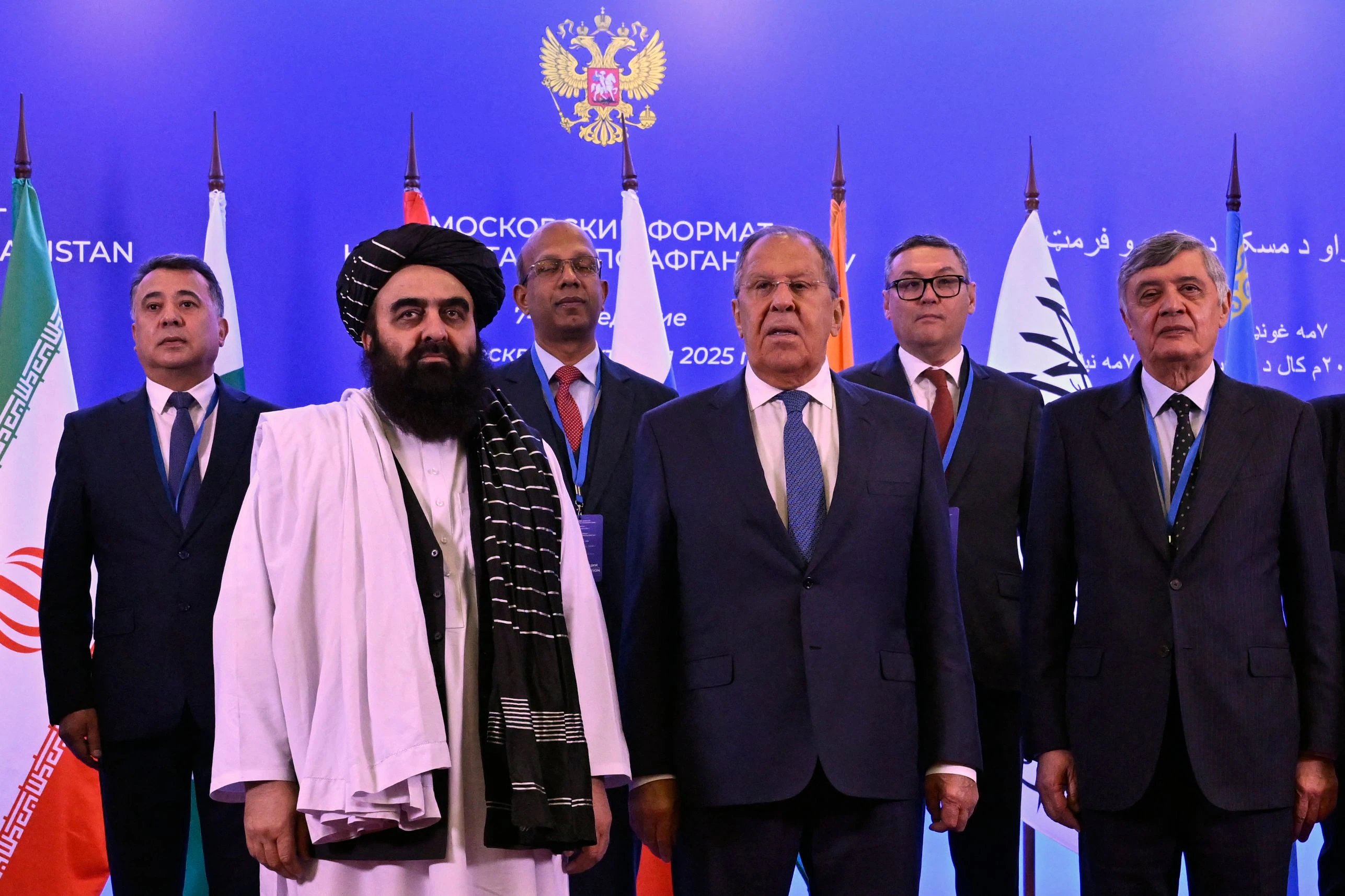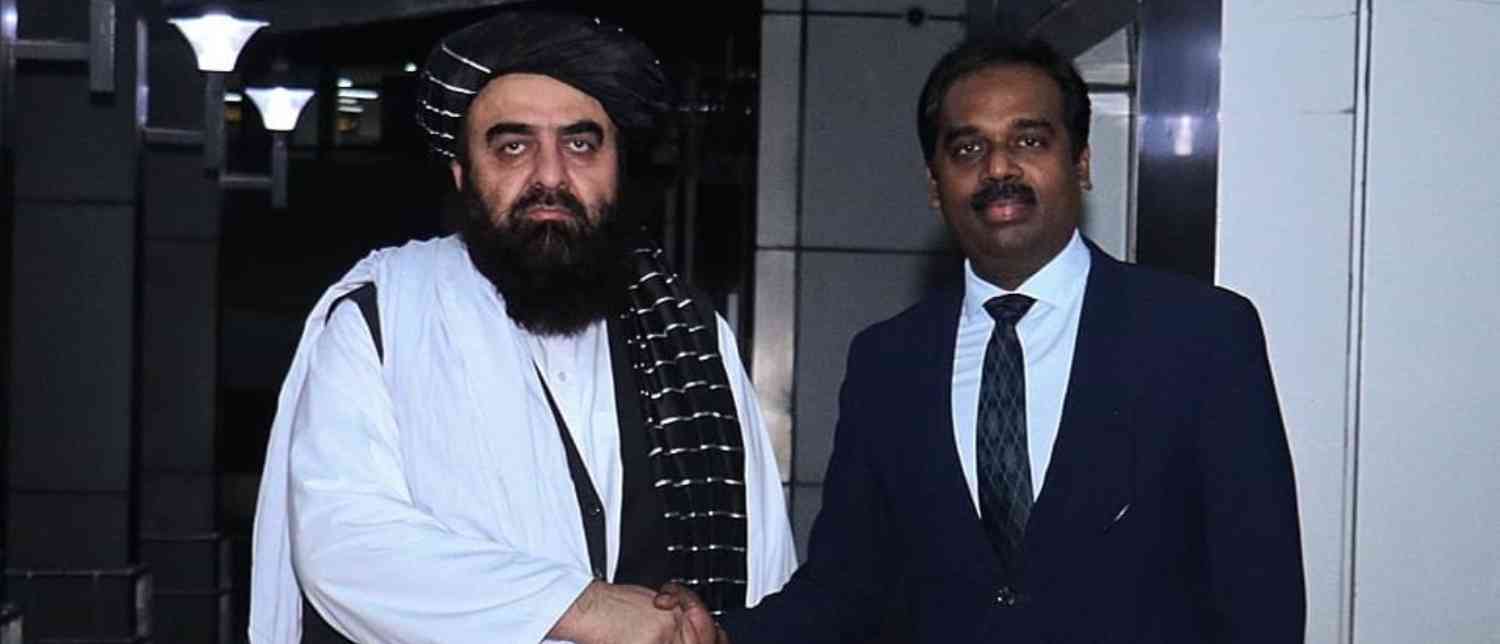Afghanistan’s Acting Foreign Minister Amir Khan Muttaqi landed in New Delhi on October 9, 2025, marking a significant diplomatic milestone between India and the Taliban-led government in Kabul. His eight-day visit follows the United Nations Security Council (UNSC) decision to grant him a travel exemption, lifting the long-standing travel ban imposed on the Taliban leader.
Muttaqi’s arrival in India comes at the invitation of Indian Foreign Minister S. Jaishankar, and represents the first ministerial-level visit from Afghanistan since the Taliban seized power in August 2021. His trip is set to continue until October 16, encompassing a series of official meetings, strategic discussions, and outreach efforts aimed at strengthening bilateral and regional ties.

A Warm Welcome and High-Level Meetings
Upon his arrival in New Delhi, Ministry of External Affairs (MEA) spokesperson Randhir Jaiswal extended a warm welcome, writing on X (formerly Twitter):
“We look forward to engaging discussions with him on bilateral relations and regional issues.”
Muttaqi’s schedule includes meetings with External Affairs Minister S. Jaishankar, senior officials of the Indian government, and possibly National Security Advisor (NSA) Ajit Doval, according to several reports. While no confirmation has been made regarding a meeting with Prime Minister Narendra Modi, sources suggest he will receive full diplomatic protocol as a visiting foreign minister.
According to Reuters, the discussions will center on bilateral cooperation, trade exchanges, export of Afghan dry fruits, healthcare collaboration, consular services, and the use of various ports for trade facilitation.
Hafiz Zia Ahmad Takal, Deputy Spokesperson of the Taliban’s Foreign Ministry, confirmed that Muttaqi will meet his Indian counterpart along with other officials to discuss “political, economic, trade, and other matters related to expanding ties between Kabul and New Delhi.”
Diplomatic Upgrade on the Cards
Muttaqi’s India visit follows his participation in the Russia-led “Moscow Format” dialogue on Afghanistan. During his week-long stay, he is expected to interact not only with Indian officials but also with business leaders and members of the Afghan community in India.
A key topic on the agenda is the upgradation of diplomatic relations — including discussions about restoring full embassy operations in both Kabul and New Delhi. Talks are also expected to cover expanding consular services and the possible reopening or upgradation of India’s embassy in Kabul, which had been shut down after the Taliban takeover in 2021.
Warm welcome to Afghan Foreign Minister, Mawlawi Amir Khan Muttaqi on his arrival in New Delhi.
We look forward to engaging discussions with him on bilateral relations and regional issues. pic.twitter.com/Z4eo6dTctJ— Randhir Jaiswal (@MEAIndia) October 9, 2025
Why Muttaqi’s Visit Holds Strategic Importance
Muttaqi’s trip marks a pivotal step in the Taliban’s ongoing efforts to gain legitimacy and build regional partnerships. So far, Russia remains the only country to have formally recognized the Taliban administration, but several nations — including India — have opened limited communication and humanitarian channels.
While India has not officially recognized the Taliban regime, it has consistently advocated for a “truly inclusive government” in Afghanistan. Nonetheless, New Delhi’s gradual re-engagement reflects a strategic necessity, driven by growing security and counterterrorism concerns in the region.
The Taliban’s dominance in Afghanistan’s political sphere has made it impossible for major regional actors to ignore their presence. For India, maintaining dialogue ensures that Afghan soil is not used for terrorist activities against any country, a stance that New Delhi has firmly reiterated.
UN Travel Ban Exemption
Muttaqi’s travel to India was made possible after the UN Security Council Committee on Taliban Sanctions approved an exemption to his travel ban on September 30, 2025.
The Sanctions Committee, which includes all 15 UNSC member states, operates by consensus. The 1988 Taliban Sanctions Committee is currently chaired by Pakistan, with Guyana and Russia serving as vice-chairs for 2025.
Muttaqi had been listed under the UNSC’s sanctions on January 25, 2001, which included a travel ban, asset freeze, and arms embargo. The temporary waiver allows him to visit New Delhi between October 9 and 16, paving the way for this unprecedented diplomatic engagement.
Past Engagements: The Jaishankar-Muttaqi Connection
This is not the first interaction between the two foreign ministers. Earlier this year, S. Jaishankar revealed that he had a “good conversation” with Muttaqi over the phone.
“I deeply appreciated his condemnation of the Pahalgam terrorist attack,” Jaishankar had said, referring to the April 22 terror attack.
Jaishankar also welcomed Muttaqi’s “firm rejection of attempts to create distrust between India and Afghanistan through false and baseless reports.” He underlined India’s traditional friendship with the Afghan people and reaffirmed continued support for their development needs.
Interestingly, Muttaqi was originally scheduled to visit India last month, but the trip was cancelled when he failed to secure a visa waiver in time.
Expert Opinions: Pragmatism Over Politics
Scholars and foreign policy experts have described India’s decision to host Muttaqi as pragmatic and strategically calculated.
Mohammad Reyaz, an expert on India–Afghanistan relations at Aliah University, Kolkata, told LiveMint:
“It was evident as early as 2010 that the Afghan Taliban was re-emerging on Afghanistan’s political landscape. India has multiple strategic interests in Afghanistan that cannot be ignored — especially at a time when anti-Taliban factions are scattered and lack support from global powers.”
Reyaz noted that India is strengthening engagement with the Taliban even as it distances itself from former Afghan allies.
“India’s engagement with the Afghan Taliban is also tied to regional security concerns — particularly fears of Pakistan’s intelligence agencies using the Taliban and other militant groups as proxies,” he added.
While many view India’s invitation to Muttaqi as a pragmatic diplomatic move, some experts caution against extending full recognition to the Taliban government until a UN-led international consensus emerges.
Vivek Katju, former diplomat and a veteran of India’s Afghanistan desk, told The Hindu:
“India should await international consensus. Through our technical assistance mission, we have already sent extensive humanitarian assistance over the last few years. Obviously, the engagement with the Taliban has become substantive and the visit of Muttaqi is a welcome step.”
India and Afghanistan: A Relationship Rooted in History
India and Afghanistan share deep civilizational and cultural ties, dating back centuries. However, after the U.S. withdrawal in 2021 and the Taliban’s return to power, India shut down its embassy in Kabul, citing security concerns.
Despite this, New Delhi has continued to deliver humanitarian assistance and support Afghan reconstruction efforts. Experts believe that India’s measured engagement is designed to safeguard regional stability and counter terrorist threats from its north-western frontier.
For the Taliban, engagement with India represents a significant opportunity. As Harsh V. Pant, Vice President of the Observer Research Foundation (ORF), and Shivam Shekhawat, Junior Fellow at ORF’s Strategic Studies Programme, wrote:
“For the Taliban, engagement with India allows them to create a perception of legitimacy for their domestic constituents. Since their return to power, they have tried to pitch their approach towards foreign policy as one based on pragmatism — with its focus on a balanced and economic foreign policy.”
In June 2022, less than a year after the Taliban takeover, India sent a technical team to Kabul to coordinate humanitarian aid and explore ways to support the Afghan people. This was followed by multiple high-level meetings in November 2024, including talks with acting Taliban Defence Minister Mullah Mohammad Yaqoob. In January 2025, Foreign Secretary Vikram Misri also met Amir Khan Muttaqi in Dubai to discuss development cooperation.
Regional Dynamics: From Moscow to New Delhi
Before arriving in India, Muttaqi participated in a regional meeting in Moscow, attended by Afghanistan’s key neighbors — India, Pakistan, Iran, China, and several Central Asian countries.
The meeting concluded with a joint statement opposing the deployment of foreign military infrastructure in the region — widely interpreted as a response to U.S. President Donald Trump’s stated objective to regain control of the Bagram Air Base near Kabul.
India’s participation in this dialogue underscores its broader strategic vision: engaging with Afghanistan in coordination with regional powers, while preventing any destabilizing influence from external military interventions.
India’s Growing Role in a Changing Afghanistan
India’s humanitarian and developmental aid remains a cornerstone of its Afghanistan policy. New Delhi has delivered food aid, medicines, and vaccines, while also hosting tens of thousands of Afghan refugees since the Taliban’s return to power.
Its diplomatic mission in Kabul currently focuses on coordinating relief and rebuilding initiatives. Earlier this month, Jaishankar spoke with Muttaqi to convey condolences over the recent earthquake in Afghanistan and announce India’s relief assistance — a gesture reinforcing India’s commitment to the Afghan people.
During his visit, Muttaqi is also expected to tour the Darul Uloom Deoband seminary — historically influential among Afghan scholars — and visit the Taj Mahal in Agra, symbolizing cultural diplomacy beyond official meetings.
Looking Ahead
Amir Khan Muttaqi’s visit to India signifies a cautious yet historic opening in India–Afghanistan relations. While formal diplomatic recognition of the Taliban government remains off the table for now, the visit underscores India’s pragmatic foreign policy — one that balances humanitarian outreach, security imperatives, and regional cooperation.
As Afghanistan’s de facto rulers seek legitimacy and economic engagement, New Delhi’s door — though not fully open — is certainly no longer closed.
With inputs from agencies
Image Source: Multiple agencies
© Copyright 2025. All Rights Reserved. Powered by Vygr Media.

























